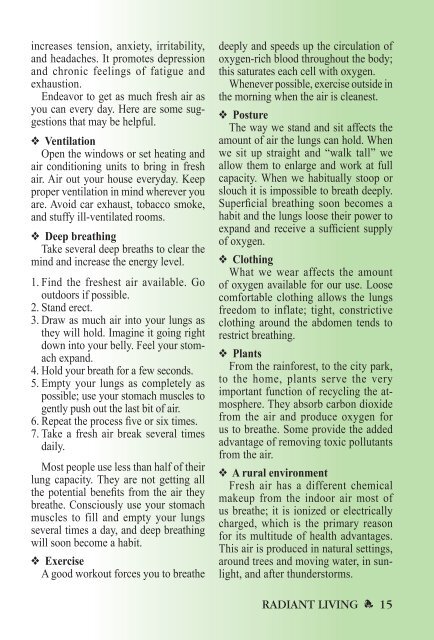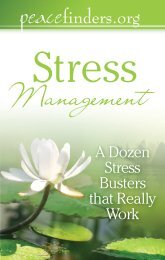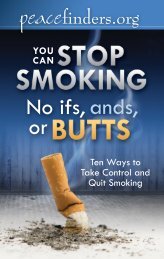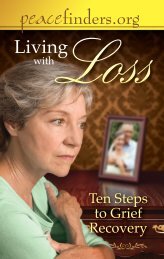Radiant Living
Create successful ePaper yourself
Turn your PDF publications into a flip-book with our unique Google optimized e-Paper software.
increases tension, anxiety, irritability,<br />
and headaches. It promotes depression<br />
and chronic feelings of fatigue and<br />
exhaustion.<br />
Endeavor to get as much fresh air as<br />
you can every day. Here are some suggestions<br />
that may be helpful.<br />
❖ Ventilation<br />
Open the windows or set heating and<br />
air conditioning units to bring in fresh<br />
air. Air out your house everyday. Keep<br />
proper ventilation in mind wherever you<br />
are. Avoid car exhaust, tobacco smoke,<br />
and stuffy ill-ventilated rooms.<br />
❖ Deep breathing<br />
Take several deep breaths to clear the<br />
mind and increase the energy level.<br />
1. Find the freshest air available. Go<br />
outdoors if possible.<br />
2. Stand erect.<br />
3. Draw as much air into your lungs as<br />
they will hold. Imagine it going right<br />
down into your belly. Feel your stomach<br />
expand.<br />
4. Hold your breath for a few seconds.<br />
5. Empty your lungs as completely as<br />
possible; use your stomach muscles to<br />
gently push out the last bit of air.<br />
6. Repeat the process five or six times.<br />
7. Take a fresh air break several times<br />
daily.<br />
Most people use less than half of their<br />
lung capacity. They are not getting all<br />
the potential benefits from the air they<br />
breathe. Consciously use your stomach<br />
muscles to fill and empty your lungs<br />
several times a day, and deep breathing<br />
will soon become a habit.<br />
❖ Exercise<br />
A good workout forces you to breathe<br />
deeply and speeds up the circulation of<br />
oxygen-rich blood throughout the body;<br />
this saturates each cell with oxygen.<br />
Whenever possible, exercise outside in<br />
the morning when the air is cleanest.<br />
❖ Posture<br />
The way we stand and sit affects the<br />
amount of air the lungs can hold. When<br />
we sit up straight and “walk tall” we<br />
allow them to enlarge and work at full<br />
capacity. When we habitually stoop or<br />
slouch it is impossible to breath deeply.<br />
Superficial breathing soon becomes a<br />
habit and the lungs loose their power to<br />
expand and receive a sufficient supply<br />
of oxygen.<br />
❖ Clothing<br />
What we wear affects the amount<br />
of oxygen available for our use. Loose<br />
comfortable clothing allows the lungs<br />
freedom to inflate; tight, constrictive<br />
clothing around the abdomen tends to<br />
restrict breathing.<br />
❖ Plants<br />
From the rainforest, to the city park,<br />
to the home, plants serve the very<br />
important function of recycling the atmosphere.<br />
They absorb carbon dioxide<br />
from the air and produce oxygen for<br />
us to breathe. Some provide the added<br />
advantage of removing toxic pollutants<br />
from the air.<br />
❖ A rural environment<br />
Fresh air has a different chemical<br />
makeup from the indoor air most of<br />
us breathe; it is ionized or electrically<br />
charged, which is the primary reason<br />
for its multitude of health advantages.<br />
This air is produced in natural settings,<br />
around trees and moving water, in sunlight,<br />
and after thunderstorms.<br />
RADIANT LIVING s 15
















